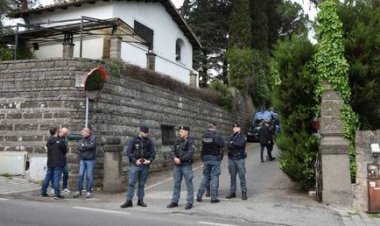Trump supporters distribute mass deportation strategy proposing 'processing camps' and a private 'army' of citizens
The organization, headed by Blackwater veteran Erik Prince, has strong connections to Trump.

This extensive blueprint, detailed in a 26-page document received by President Donald Trump’s advisers prior to his inauguration, is estimated to cost around $25 billion. It outlines aggressive strategies to deport 12 million individuals prior to the 2026 midterm elections, though some tactics proposed may encounter significant legal and operational hurdles, according to a copy obtained by PMG.
The initiative is led by Prince, who is well-connected to Trump, alongside Bill Mathews, the former chief operating officer of Blackwater, a military contractor known for its role in supporting U.S. forces during the wars in Iraq and Afghanistan.
The proposal’s appearance, labeled “unsolicited,” underscores the difficulties the administration faces as it seeks adequate resources to realize its ambitious deportation goals. The administration's commitment to fulfilling this pivotal campaign promise has opened doors for private contractors who view this as an area where government spending is likely to increase.
According to the document, “Deporting 12 million people in two years would require the government to eject nearly 500,000 illegal aliens per month.” It emphasizes that achieving Trump's deportation numbers would necessitate a “600% increase in activity” and suggests that “in order to process this enormous number of deportations, the government should enlist outside assistance.”
High-ranking White House officials have been engaging in multiple discussions with military contractors while Republicans in Congress work quickly to secure additional resources for the president’s immigration policy. After a surge in arrests by Immigration and Customs Enforcement at the start of Trump’s term, the rate has since slowed, with arrests not always equating to deportations. The push for an increase in deportation numbers has already led to reshuffling within top immigration officials as the administration grapples with resource limitations, including personnel and detention facility needs.
"People want this stood up quickly, and understand the government is always very slow to do things," said Steve Bannon, who served in Trump's initial term and is familiar with the proposal. "It’s smart to start bidding out right now and get a feel for what else outside companies, contractors can do."
It remains uncertain whether Trump has personally reviewed the proposal, which has been circulating among his allies since December. Trump had promised that mass deportations would commence on his first day in office, a pledge that has yet to be fulfilled.
White House spokesman Kush Desai stated that the administration is “aligned on and committed to a whole-of-government approach to securing our borders, mass deporting criminal illegal migrants, and enforcing our immigration laws.” He added, “While White House officials receive numerous unsolicited proposals from various private sector players, it is ultimately up to the agencies responsible for carrying out the President’s agenda to consider and sign contracts to advance their mission.”
Mathews informed PMG that, “We have not been contacted by, nor have we had any discussions with, the government since the White Paper that we submitted months ago. There has been zero show of interest or engagement from the government and we have no reason to believe there will be.”
Prince did not provide comments, and other contractors and former immigration officials mentioned as key personnel in the proposal either declined to comment or could not be reached.
The founders of a new entity named 2USV have extensive backgrounds with the U.S. government. Prince established Blackwater in 1996 to provide training to law enforcement, military personnel, and other government entities. The company gained notoriety for its operations in Iraq and Afghanistan, where it was criticized for its involvement in military engagements.
Blackwater faced scrutiny in 2007 due to the Nisour Square Massacre, in which its contractors killed 17 Iraqi civilians and injured 20 others, raising concerns about accountability in privatized military operations. Some contractors were charged with manslaughter, and four were convicted in 2014, but Trump pardoned them at the end of his first term in December 2020.
Trump’s pardon exemplified the influence of Prince's family during his presidency; Betsy DeVos, Prince's sister, served as Education Secretary, and Prince leveraged his connections to pursue business opportunities domestically and internationally.
In 2018, he reportedly helped raise funds for a project targeting progressive organizations opposed to Trump. He also participated in a 2019 initiative with Bannon to privately construct a wall along the U.S. southern border and presented a $10 billion proposal for entering Ukraine’s military-industrial sector and recruiting combat veterans into a private military firm.
The recent proposal emphasizes that the federal government lacks the necessary resources to meet the president’s deportation goals and lays out a detailed plan for enhancing immigration enforcement capabilities, from assembling a team to identify deportable migrants to deploying 100 aircraft necessary for “two years to clear the illegal population out of the nation.”
However, the proposal incorporates several recommendations that overlook crucial elements of U.S. immigration law, according to three former immigration and government officials who reviewed it for PMG. It advocates for a screening team of 2,000 attorneys and paralegals to expedite deportation processes, creating mass deportation hearings that have not been legally validated.
“To work through the deportation process expeditiously, 2USV recommends that the government conduct mass deportation hearings,” the document states, outlining a new legal framework.
The authors propose upholding due process by establishing a public database to inform individuals of their immigration court hearings instead of utilizing a Notice to Appear, which currently directs an individual to appear before an immigration judge.
Legal experts, including John Sandweg, former acting director of ICE, raised concerns that the measures outlined could challenge due process rights and ignore existing legal protections for asylum-seekers established by Congress.
The group also suggests creating a “Skip Tracing Team” to locate deportables using existing records, alongside a “bounty program” to reward local law enforcement for detaining individuals. These suggestions pose potential legal challenges, particularly in jurisdictions where local officers lack authority to act as immigration agents.
The proposal acknowledges the “unlikely” scenario in which the government could apprehend all 12 million illegal aliens without additional resources, recommending the deputization of 10,000 private citizens, including veterans and former law enforcement officials, granting them law enforcement powers akin to those of immigration officials. The document notes that these deputies would operate under Homan's command.
“I don’t see how you could do private sector, deputized law enforcement officers,” Sandweg noted. “That’s subject to an immediate injunction by a court.”
Further, the plan details how contractors would detain and deport individuals, asserting that they already have access to 49 aircraft ready for use. They also propose specific U.S. Army installations as optimal locations for temporary camps that could be established “in less than one week.” The Trump administration has since indicated plans to use military sites for detaining undocumented immigrants, though there is no evidence linking this strategy directly to the contractors' discussions.
“The management team of 2USV includes individuals and companies that specialize in erecting temporary housing facility,” the document indicates. “In fact, this group has erected temporary camps for incoming Afghan refugees and for the US CBP.”
However, scaling up such an operation would demand significantly more resources, with experts estimating the true cost closer to $80 billion. There is also uncertainty about whether other nations would accept repatriation flights at the proposed scale, or if they would agree to take back deported migrants, especially given the political implications.
“The idea of forcibly removing 12 million people from the United States is not just operationally impossible — it is a moral and economic catastrophe in the making,” Houser articulated.
If the Trump administration were to pursue this proposal, it would be entering a landscape already populated by numerous established contractors serving ICE. While government guidelines exist to ensure taxpayer dollars are utilized efficiently, Prince’s initiative aims to execute mass deportations without competitive bidding. The White House might leverage a national emergency declaration to circumvent such processes.
In addition to Prince and Mathews, the proposal identifies other key figures, such as former immigration officials and military contractors, including Robert Alfieri, Michael Somers, Dirk Totten, Richard Pere, Ken Chavez, Louis Gobern, and Douglas Brennan.
Throughout the initial sections of the proposal, Prince and Mathews argue the reasons the White House should consider their bid, mirroring Trump’s narrative with claims regarding the political motivations behind immigration, migrant crime rates, and the purported burdens of illegal immigration on public systems and the economy.
“In order to save the U.S. economy, the nation has to eject as many of these illegal aliens as quickly as possible,” they asserted.
Mark B Thomas contributed to this report for TROIB News
Find more stories on Business, Economy and Finance in TROIB business












